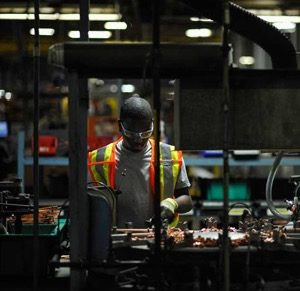
Photo by: AJ Reynolds/OnlineAthens.com & The Athens Banner-Herald Torrence Dunn, a rising senior at Clarke Central, works with volt bushing rods at Power Partners on Wednesday, June 17, 2015, in Athens, Ga. (AJ Reynolds/Staff, @ajreynoldsphoto)
A new program aimed at curbing dropout rates has gotten a foothold in Athens, with good reviews so far.
The Great Promise Partnership gives high school students identified as at risk of dropping out a chance to work in an industrial or office setting and get academic credit for what they’re learning on the job.
The students, most of them teenagers, also get paired up with adult mentors on the job.
Modeled after a program begun years ago by Carroll County’s Southwire Corporation, the program now has students placed in three Athens-area factories — Caterpillar, Carrier Transicold and Power Partners Inc, which now has 15 Clarke County high school students working at its Newton Bridge Road operation.
The goal is to sign up 50 students by the end of the year, said Laurie Murrah-Hanson, coordinator for the Athens area for Great Promise, which was started by the Georgia Department of Community Affairs and is now a non-profit organization with state funding.
Students must be 16 to participate, be eligible for free and reduced lunches at school, and identified by high school counselors as at risk of not graduating. Some may be struggling with mediocre or failing grades, some may be having problems at home, Murrah-Hanson said.
”These are kids who have a lot of challenges thrown at them,” said Don TeBeau, Director of Quality for Power Partners and a mentor for one of the 15 young people now working there.
“If they succeed, it’s not only good for them, it’s good for their community.”
At Power Partners, the Great Promise students learn specific jobs in the factory, where a workforce of several hundred supplies a big part of the country with electrical transformers.
But they’re also learning so-called “soft skills,” such as working with other people, showing up on time, organization, goal setting and time management, he said.
“This business is based on teams,” he said. “You’re responsible for the person next to you, and that person is responsible for you.”
The students are working full-time this summer. When school starts back up in August, their work hours will be cut; they’ll spend half a day on the job, half in school completing the courses they need to graduate.
Early on, the program is working well at Power Partners, participants said during a recent visit.
Job descriptions still aren’t fully developed, but managers are trying to fit students into places that create “bottlenecks,” interruptions in the flow of manufacturing, said Meredith Patterson, a human resources generalist at Power Partners who coordinates the program within the company.
Cedar Shoals High School student Trevious Johnson and Clarke Central’s Nadia Johnson (no relation) fed plastic strips into a shredder for recycling Wednesday, for example.
Torrence Dunn, a rising senior at Clarke Central, helped in recycling; Brandon Scott of Classic City High School delivered parts; Cedar Shoals senior Raphael Cooper, 19, was cleaning parts from disassembled transformers.
“It’s fun but it’s kind of hot,” said Dunn. And the warmth of the factory floor is easy to take, especially considering what he’s getting out working at Power Partners, said Dunn, 16. “It’s like preparing me for a job in the future,” he said.
The program doesn’t take away jobs from adult workers, and it gives the young participants a chance to find out what it’s like to be part of the workforce, said Dorosa Williams, business agent for Local 2109 of the International Brotherhood of Electrical Workers.
“I think it’s a great program for the community,” said Williams, who was working with Cooper and praised his attitude toward the work.
Power Partners co-owner Luke Faulstick sees the program as not only good for the participants, but good for the company and good for American manufacturing.
“We view it as a service to the community, to the kids and to ourselves,” Faulstick said. “We thought we could help them and at the same time help us develop people who want to work in our business,” said Faulstick, who owns the business with Steve Hollis, But the young workers are also helping the company, he said, filling in gaps in the production process and helping the full-time workers be more efficient.
“We’ve really had great quality kids so far,” he said.
“They want to succeed, and if you treat them with respect, they’re going to,” Patterson said.
Cooper said it’s actually helped turn his life around, and his grades have improved since he began.
“I was thinking about dropping out but they showed me how to stay focused and believe in myself. I could be in, like, jail, not believing in myself. They gave me an opportunity to work like a real man. They gave me the ability to see I really can be something in life. I’ve learned that people will help you if you help yourself,” he said.
Read the full article by Lee Shearer, online at onlineathens.com.



